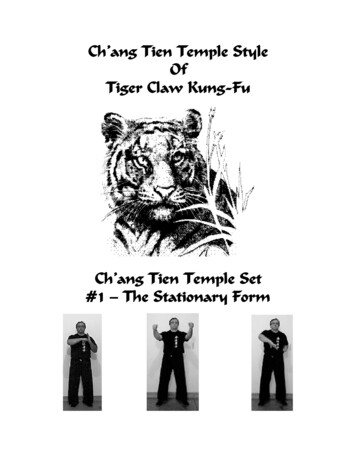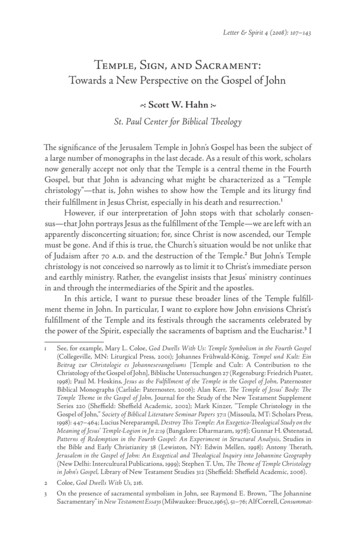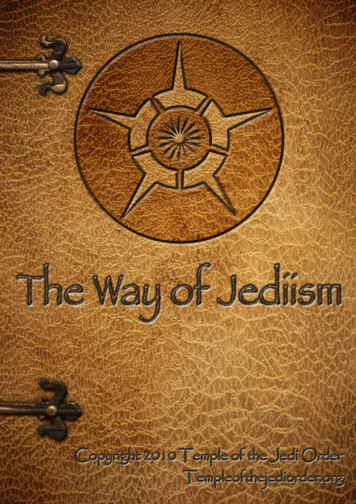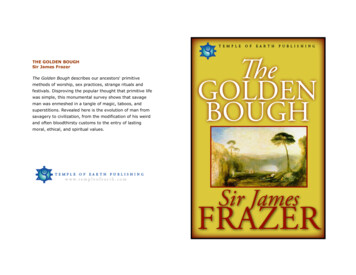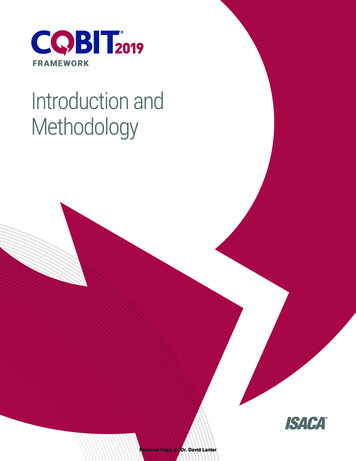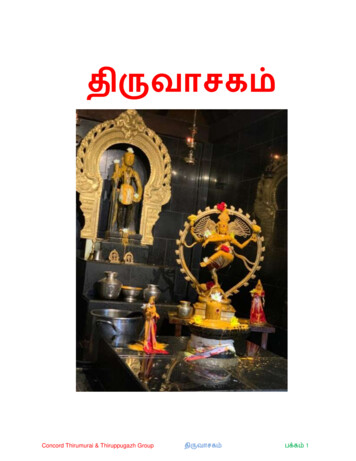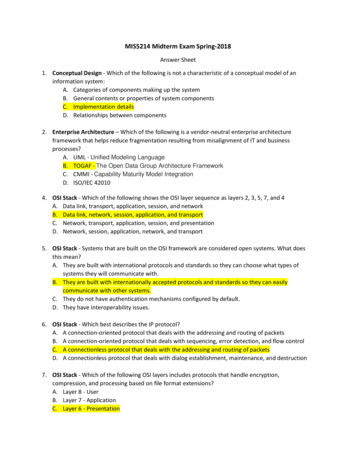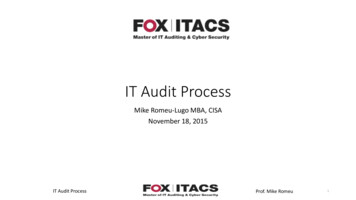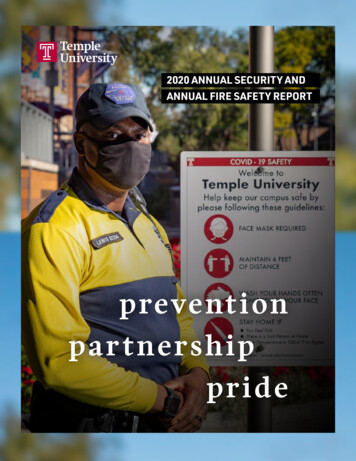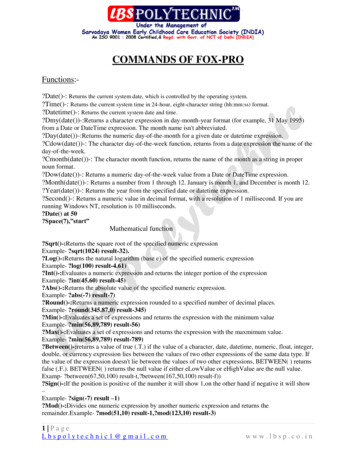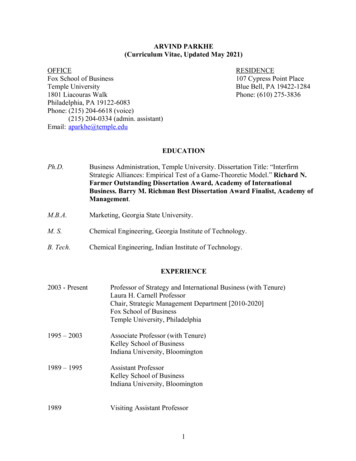
Transcription
ARVIND PARKHE(Curriculum Vitae, Updated May 2021)OFFICEFox School of BusinessTemple University1801 Liacouras WalkPhiladelphia, PA 19122-6083Phone: (215) 204-6618 (voice)(215) 204-0334 (admin. assistant)Email: aparkhe@temple.eduRESIDENCE107 Cypress Point PlaceBlue Bell, PA 19422-1284Phone: (610) 275-3836EDUCATIONPh.D.Business Administration, Temple University. Dissertation Title: “InterfirmStrategic Alliances: Empirical Test of a Game-Theoretic Model.” Richard N.Farmer Outstanding Dissertation Award, Academy of InternationalBusiness. Barry M. Richman Best Dissertation Award Finalist, Academy ofManagement.M.B.A.Marketing, Georgia State University.M. S.Chemical Engineering, Georgia Institute of Technology.B. Tech.Chemical Engineering, Indian Institute of Technology.EXPERIENCE2003 - PresentProfessor of Strategy and International Business (with Tenure)Laura H. Carnell ProfessorChair, Strategic Management Department [2010-2020]Fox School of BusinessTemple University, Philadelphia1995 – 2003Associate Professor (with Tenure)Kelley School of BusinessIndiana University, Bloomington1989 – 1995Assistant ProfessorKelley School of BusinessIndiana University, Bloomington1989Visiting Assistant Professor1
College of Business and AdministrationDrexel University, Philadelphia1986 – 1989Doctoral Student with University FellowshipSchool of Business and ManagementTemple University, Philadelphia1979 – 1985Manager of Purchasing & AdministrationGruner & Jahr AG, GermanyEurope and the United StatesRESEARCH INTERESTSGlobal Supply ChainsStrategic Alliances, International Joint Ventures, and Global NetworksCooperation as a Means to Gain Competitive AdvantageAlliances and TrustEffective Management of Interfirm Diversity in International AlliancesResearch MethodsPUBLICATIONSResearch Articles PublishedParkhe, A. (2011) “Form follows function? Interorganizational networks as a strategicimperative for global strategies”, Global Strategy Journal, 1:86-89.Parkhe, A. (2010). “Research Issues and Future Directions in Strategic Alliances”,International Journal of Strategic Business Alliances, 1[4]: 392-397.Parkhe, Arvind, & Kim, J.H. (2009), “Competing Similarity and Cooperating Similarity inGlobal Strategic Alliances,” British Journal of Management, 20: 364-376.Parkhe, Arvind (2007), “Japan’s Network Economy: Structure, Persistence, and Change,”Academy of Management Review, 32: 303-307.Parkhe, Arvind (2007), “International Outsourcing of Services,” Journal of InternationalManagement, 13: 3-6.Parkhe, Arvind, Wasserman, S., & Ralston, D. A. (2006), “New Frontiers in Network TheoryDevelopment,” Academy of Management Review, 31: 560-569.Dhanaraj, C., & Parkhe, Arvind (2006), “Orchestrating Innovation Networks,” Academy ofManagement Review, 31: 659-669.2
Parkhe, Arvind (2006), “Research Methods in Alliances,” in Handbook of Strategic Alliances,O. Shenkar and J. Reuer (eds.), Beverly Hills, CA: Sage, pp. 369-380.Parkhe, Arvind (2005), “International Alliances,” in Handbook for International ManagementResearch, 2nd edition, B. J. Punnett and O. Shenkar (eds.), Ann Arbor, MI: University ofMichigan Press, pp. 210-238.Parkhe, Arvind (2004), “Interviews: A Key Data Source in International Business Research,” inHandbook of Qualitative Research Methods for International Business, R. Marschan-Piekkariand C. Welch (Eds.), Cheltenham, U.K.: Edward Elgar.Parkhe, Arvind (2003), “Institutional Environments, Institutional Change, and InternationalAlliances,” Journal of International Management, 9: 305 – 316Parkhe, Arvind, & Dhanaraj, C. (2003), “Orchestrating Globally: Managing the MultinationalEnterprise as a Network,” In Research in Global Strategic Management, Alan M. Rugman(ed.), 8: 197 – 214Danis, W., & Parkhe, Arvind (2002), “Hungarian – Western Partnerships: A GroundedTheoretical Model of Integration Processes and Outcomes,” Journal of International BusinessStudies, 33: 423-455Miller, S.R. & Parkhe, Arvind (2002), “Is There a Liability of Foreignness in Global Banking?An Empirical Test of U.S. Banks’ X-Efficiency,” Strategic Management Journal, 23: 55 – 75Parkhe, Arvind (2001), “A Culture of Cooperation? Not Yet,” in The Allianced Enterprise:Global Strategies for Corporate Collaboration, A. P. de Man, G. Duysters, and A. Vasudevan(eds.), London: Imperial College Press, pp. 119 – 132.Parkhe, Arvind (2001), “Interfirm Diversity in Global Alliances,” Business Horizons, November– December: 2 – 5Parkhe, Arvind & Miller, S.R. (2000), “The Structure of Optimal Trust,” Academy ofManagement Review, 25(1):10 – 21Parkhe, Arvind (2000), “Hurdles in the Hurtle Toward an Age of Alliances,” Business Horizons,September – October.Parkhe, Arvind (2000), “Outsourcing and Changing Organizational Forms in the New GlobalEconomy: Lessons from the Field,” The Global Connection, 7(2): 6 – 10.Parkhe, Arvind (1998), “Understanding Trust in International Alliances”, Journal of WorldBusiness, 33(3): 219-241.3
Parkhe, Arvind (1998), “Developing Trust in International Alliances”, Journal of WorldBusiness, 33(4): 417-438.Reprinted in Cross-Cultural Management (2002), Gordon Redding and BruceW. Stening (Eds.), Northampton, MA: Edward Elgar Publishing.Parkhe, Arvind & Miller, S. R. (1998), “Foreign Operations of U. S. Banks: Impact ofEnvironmental Differences and Ownership Advantages on Organizational Form Preferences,”Journal of International Management, 4(1): 59 – 83.Miller, S. R. & Parkhe, Arvind (1998), “Foreign Expansion Patterns of U. S. Banks: AnEmpirical Analysis,” Proceedings of the Midwest Academy of International Business, Chicago.Best Paper AwardMiller, S. R., & Parkhe, Arvind (1998), “Patterns in the Expansion of U. S. Banks’ ForeignOperations,” Journal of International Business Studies, 29(2): 359 – 390Parkhe, Arvind (1998), “Current Issues in International Alliances,” Business Horizons,November – December: 2 – 3.Parkhe, Arvind & Liang, N. (1997), “Importer Behavior: The Neglected Counterpart ofInternational Exchange,” Journal of International Business Studies, 28(3): 495 – 530.Parkhe, Arvind (1996), “International Joint Ventures,” in Handbook of InternationalManagement Research, Betty Jane Punnett and Oded Shenkar (Eds.), Oxford, England:Blackwell, pp. 429 – 460.Reprinted in Strategic Alliances: Theory and Evidence (2004), Jeffrey Reuer(Ed.), Oxford, U. K.: Oxford University Press, pp. 69-92.Parkhe, Arvind (1993), “’Messy’ Research, Methodological Predispositions, and TheoryDevelopment in International Joint Ventures”, Academy of Management Review, 18: 227-268.AMR 1993 Best Article Award Nominee. Reprinted in Strategic Alliances(1997), Paul W. Beamish (Eds.) Northampton, MA: Edward ElgarPublishing.Parkhe, Arvind (1993), “Strategic Alliance Structuring: A Game Theoretic and Transaction CostExamination of Interfirm Cooperation”, Academy of Management Journal, 36: 794-829.Parkhe, Arvind (1993), “Partner Nationality and the Structure-Performance Relationship inStrategic Alliances”, Organization Science, 4(2): 301-324.Reprinted in Strategic Alliances (1997), Paul W. Beamish (Ed.),Northampton, MA: Edward Elgar Publishing4
Parkhe, Arvind, Rosenthal, E. C., & Chandran, R. (1993), “ Prisoner’s Dilemma Payoff Structurein Interfirm Strategic Alliances: An Empirical Test,” Omega, 21(5): 531 – 539.Parkhe, Arvind, Smith, M. F., & Chandran, R. (1993), “An Application of Porter’s StrategicManagement Framework to Fast Food Retailing Performance,” Journal of Food ProductsMarketing, 1(2): 43 – 55.Parkhe, Arvind (1992), “U. S. National Security Export Controls: Implications for GlobalCompetitiveness of U. S. High-Technology Firms,” Strategic Management Journal, 13: 47- 66.Parkhe, Arvind (1991), “Interfirm Diversity, Organizational Learning, and Longevity in GlobalStrategic Alliances”, Journal of International Business Studies, 22(4): 579-601.2001 JIBS Decade Award. Reprinted in (a) Extracts (1997), Centre forLabour Market Studies, University of Leicester, England; (b) InternationalManagement: A Reader (1995), London: Dryden Press.Parkhe, Arvind (1991), “International Portfolio Analysis: A New Model”, ManagementInternational Review, 31(4): 365-379.Parkhe, Arvind (1990), “Interfirm Strategic Alliances: Empirical Test of a Game – TheoreticModel,” Dissertation abstracted in the Journal of International Business Studies, 21(4): 705.Haines, D., Chandran, R., & Parkhe, Arvind (1989), “Winning by Being First to Market .orSecond?” Journal of Consumer Marketing, 6(1): 63 – 69.Parkhe, Arvind, & Smith, M. F. (1989), “A General Systems Perspective on the Performance ofMarketing in Society,” Proceedings of the American Marketing Association Summer Educators’Conference (Gary Frazier & Charles Ingene, Eds.), Chicago, pp. 281 – 284.Chandran, R., Parkhe, Arvind, & Phatak, A. (1988), “Generalized System of Preferences and theNew Realities of International Competition,” Asia Pacific International Journal of BusinessLogistics, 1(2): 2 – 8.Papers under Review“Know When to Hold’em, When to Fold’em: Factoring Data-related Risks in China,” atHarvard Business Review (with Julianne Sellin)Papers in Preparation“End of an Era: China’s Shrinking Role in Global Supply Chains,” for submission to SupplyChain Management: An International Journal.5
“United States as the Orchestrator of a Global Techno-coalition: Mitigating National SecurityThreat Number One,” for submission to Journal of International Business Policy (with JulianneSellin).“Semiconductors as China’s Achilles Heel: Bringing Big Power Confrontation to a PeacefulEnd,” for submission to Foreign Affairs.“Data Risks in China: Policy Implications for Government Officials and Corporate Executives,”for submission to Journal of International Business Policy (with Julianne Sellin).Professional Conference PresentationsDhanaraj, C., and Parkhe, Arvind*. [2017], “Translational Research in Business: GeneratingKnowledge at the Interface of Academia and Industry,” paper presented at the Academy ofManagement, Atlanta. [*Paper presented by Dr. Dhananarj]Genc, O., Parkhe, Arvind*, and Choi, J.J. [2014], “How Do International Acquisitions Affect theCompetitiveness of Companies?” paper presented at the Academy of International Business,Southwest Chapter, Strategic Management Track, Dallas. [*Paper presented by Dr. Genc]Winner, 2014 Best Paper AwardParkhe, Arvind (2013), “CUIBE: Creating an Organization with an Impact,” paper presented atthe Consortium for Undergraduate International Business Education annual meeting, Boise.Parkhe, Arvind (2012), “Best Practices in Study-Abroad Programs,” paper presented at theConsortium for Undergraduate International Business Education annual meeting, Miami.Parkhe, Arvind (2010), “Global Strategies and Interorganizational Networks,” paper presented atStrategic Management Society’s invitation-only launch conference for Global Strategy Journal,Chicago.Parkhe, Arvind (2007), “Come, Let Us Reason Together: Some Challenges in AllianceContracting Processes,” paper presented at the Academy of Management annual meeting,Philadelphia.Parkhe, Arvind (2007), “From Autarky to Ecosystems: A Multi-Level Perspective ofInterorganizational Integration,” paper presented at the Academy of Management annualmeeting, Philadelphia.Parkhe, Arvind, & Han, T. (2007), “A Multi-Level Analysis of Host-Country Factors in GlobalSoftware Outsourcing,” paper presented at the Academy of International Business annualmeeting, Indianapolis.6
Parkhe, Arvind (2006), “Separate but Blended Organizations: Innovations in ResourceConfiguration and Organizational Boundary-Making,” paper presented at the AllianceConference, Nijmegen, the Netherlands.Parkhe, Arvind, & Kim, J. H. (2004), “Competing Similarity and Cooperating Similarity inGlobal Strategic Alliances,” paper presented at the Academy of International Business annualmeeting, Stockholm, Sweden.Dhanaraj, C., & Parkhe, Arvind (2003), “Headquarters as Global Orchestrator of MNENetworks,” paper presented at the Academy of Management annual meeting, Seattle.Parkhe, Arvind, & Lee, B. H. (2003), “Do International Strategic Alliances Create Firm Value?Cases of U. S.- Japanese Technology Alliances,” paper presented at the Academy ofManagement annual meeting, Seattle.Lee, B., Parkhe, Arvind, & Lyles, M. A. (2003), “Market Valuation of International R&DAlliances in High Technology Industries,” paper presented at the Academy of Managementannual meeting, Seattle.Lee, B., Parkhe, Arvind, & Lyles, M. A. (2002), “International Technology Alliances and FirmValue Creation: A Knowledge-Based Approach,” paper presented at the Academy ofInternational Business annual meeting, Puerto RicoParkhe, Arvind, & Dhanaraj, C. (2002), “Orchestrating Globally: Managing the MultinationalEnterprise as a Network,” paper presented at the IU – IB (Indiana University – InternationalBusiness) Research Conference, Bloomington.Rehg, M., & Parkhe, Arvind (2002), “Whistleblowing as a Global Construct: Cultural Influenceson Reporting Wrongdoing at Work,” paper presented at the International WhistleblowingSeminar, Indiana University, Bloomington.Parkhe, Arvind (2001), 2001 JIBS Decade Award panel presentation, Academy of InternationalBusiness annual meeting, Sydney, Australia.Parkhe, Arvind, & Lee, B. H. (2001), “Interfirm Cooperation and Firm Value: A Study of U. S. –Japanese Strategic Alliances in High – Technology Industries,” paper presented at the 2001Academy of International Business Southeast Conference, New Orleans.Parkhe, Arvind, & Miller, S. R. (2000), “Performance of Host-Country and Foreign-OwnedFirms: A Liability of Foreignness and National Competitive Advantage Perspective,” paperpresented at the Academy of International Business annual meeting, Phoenix.Parkhe, Arvind, & Miller, S. R. (1999), “The Liability of Foreignness: An Empirical Test in theGlobal Banking Industry,” paper presented at the National Academy of Management annualmeeting, Chicago.7
Miller, S. R. & Parkhe, Arvind (1999), “Home – Country Environment as a Source ofInternational Competitiveness: An Analysis of the Global Banking Industry,” paper presented atthe Academy of International Business annual meeting, Charleston.Rehg, M.T., & Parkhe, Arvind (1999), “Whistle – Blowing Behavior in a Global Economy: AnExtended Model,” paper presented at the National Academy of Management annual meeting,Chicago.Parkhe, Arvind, & Miller, S. R. (1998), “A Bank – Level Empirical Analysis of OrganizationalForm Preferences of U. S. Banks,” paper presented at the National Academy of Managementannual meeting, San Diego.Miller, S. R. & Parkhe, Arvind (1998), “The Impact of Host Country Banking SystemDevelopment and Banking Regulations on U. S. Banks’ International Organizational FormPreferences: A Bank – Level Analysis,” paper presented at the Academy of InternationalBusiness Meeting, Vienna.Miller, S. R. & Parkhe, Arvind (1998), “Foreign Expansion Patterns of U. S. Banks: AnEmpirical Analysis,” paper presented at the Midwest Academy of International Business AnnualMeeting, Chicago.1998 Distinguished Paper Award, also published in ProceedingsParkhe, Arvind, Kaghan, W., Sakson, J., Keidel, K. W., & Zohar, A. (1996), “Beyond thePrisoner’s Dilemma: Exploring the Game Metaphor in Management,” Joint BPS – OMTDivision symposium, National Academy of Management Annual Meeting, Cincinnati.Parkhe, Arvind (1994), “Conflict in global strategic alliances: A model and performanceimplications,” paper presented at the Academy of International Business Meeting, Boston.Parkhe, Arvind (1993), “The Conceptual Domain of Trust in International Joint Ventures,” paperpresented at the Academy of International Business Meeting, Hawaii.Salk, J. E., Inkpen, A., Parkhe, Arvind, & Doz, Y. (1993), “Performance, Trust, and theNegotiated Order in International Joint Ventures,” panel presentation at the Academy ofInternational Business Meeting, Hawaii.Parkhe, Arvind (1992), “Cooperative Strategy Research: A Philosophy of Science Perspective onBarriers to International Joint Ventures Theory Development,” paper presented at the Academyof International Business Meeting, Brussels.Parkhe, Arvind (1991), “Partner Nationality and the Structure – Performance Relationship inStrategic Alliances,” paper presented at the Academy of International Business Meeting, Miami.8
Parkhe, Arvind, & Shin, R. W. (1991), “The Case Study Method in International Joint VenturesResearch: A Fresh Assessment and an Application,” paper presented at the Academy ofInternational Business Meeting, Miami.Shin, R. W. & Parkhe, Arvind (1991), “The Privatized Urban Housing Policy: A Study ofDistributive Dimensions in the Joint Redevelopment Project in Seoul,” paper presented at theInternational Institute of Administrative Sciences, Copenhagen.Parkhe, Arvind (1988), “Interfirm Cooperative Arrangements: A Game – Theoretic Model,”paper presented at the Academy of International Business Meeting, San Diego.Parkhe, Arvind & Smith, M. F. (1988), “A General Systems Perspective on the Performance ofMarketing in Society,” paper presented at the American Marketing Association SummerEducators’ Conference, San Francisco.Paper also published in Best Paper Proceedings, Gary Frazier and CharlesIngene (eds.), Chicago: American Marketing Association, pp. 281 – 284Parkhe, Arvind (1987), “Portfolio Analysis: A Synthesis and an Extension,” paper presented atthe Academy of International Business Meeting, Chicago.Session Chair, Invited Papers, TV Speeches, Newspaper InterviewsProgram Chair, Consortium for Undergraduate International Business Education meeting,October 4-6, 2018, Philadelphia.Session Chair, “Acquisitions, Alliances, and Exporting Practices in Emerging Markets,”Academy of International Business annual meeting, New Orleans, July 2016.Parkhe, Arvind and Rob Drennan [2013], “Department Chairs’ Response to TAUP’s ‘Chairs intoManagers’ Temple University Faculty Herald, 43[5].Parkhe, Arvind (2007), “A Multi-Level Analysis of Host-Country Factors in Global SoftwareOutsourcing,” paper presented at Michigan State University, Lansing, Michigan.Session Chair, “Strategic Alliances” conference, IESE, Barcelona, Spain, June 2005.Session Chair, “Security and Regional Issues,” 6th annual International Business ResearchForum, Temple University, April 2005.“Culture Series” talk before the International Business Association (IBA) of the Fox School,October 2004.9
Session Chair, “Dynamic Capabilities in IB Research,” at the 2nd annual Emerging ResearchFrontiers in International Business Studies Conference, East Lansing, Michigan, September2004.Invited paper presentation, “Institutional Environments, Institutional Change, and InternationalAlliances,” at the University of Central Florida, October 2002.Invited paper presentation, “International Alliances and Institutional Theory,” at the Universityof Illinois at Urbana – Champaign, April 2002.Invited paper presentation, “Impact of Institutional Differences on International Alliances,” atResearch Forum on Institutions and International Business, Temple University, Philadelphia,March 2002.Invited Research Seminars, Kellogg School of Management (Northwestern University), 1996;University of Pittsburgh, 1994.Additional Invited Research Seminars (declined): Anderson Graduate School of Management(UCLA); Wayne State University.Chair, panel discussion on “Relevance and Knowledge Management in International StrategicAlliance Research,” Academy of International Business 2000 annual conference, Phoenix.Multiple invited TV appearances (Kelley Commentaries) on Indiana Business This Week, onABC – TV, Indianapolis.Published interview in Indianapolis Business Journal, “Leveraging Resources: How AlliancesAre Lifting Small Companies.”Invited speech for the Indiana Global Business Competitiveness Council, Indianapolis,“Interfirm Diversity in Global Strategic Alliances.”DISTINCTIONS, GRANTS, AND AWARDSResearch – Related2014 Best Paper Award, Academy of International Business Southwest Chapter, StrategicManagement Track [with Omer Genc and J.J. Choi], “How Do Inte
Logistics, 1(2): 2 – 8. Papers under Review “Know When to Hold’em, When to Fold’em: Factoring Data-related Risks in China,” at Harvard Business Review (with Julianne Sellin) Papers in Preparation “End of an Era: China’s Shrinking Role in Global Supply Chains,” for submiss
